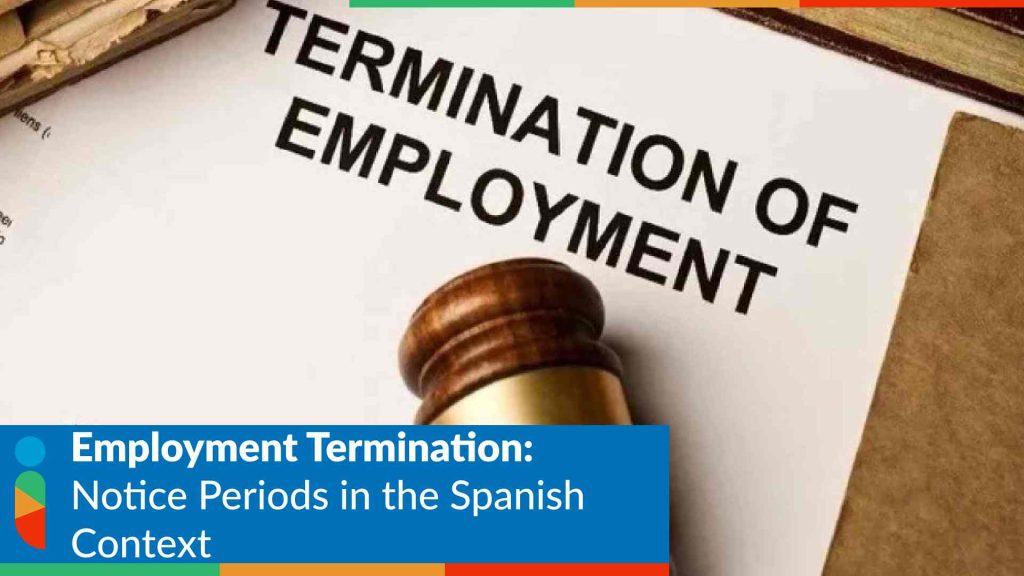When an employment contract in Spain comes to an end, a notice period agreement is necessary by both of the parties. The notice period in Spain is established by law or by the collective agreement applicable to the sector.
In this article, we will explain the different types of employment contracts and their notice period in the Spanish context. We will also provide some tips on how to handle the termination process in a professional and respectful way. Moreover, we will discuss the consequences of violating the notice period on the compensation are discussed.
Types of Employment Contracts and Their Notice Periods in Spain
When you are an employer or an employee in Spain you need to reassure your position. Therefore, is understandable if you wonder what is the notice period in Spain for terminating an employment contract. In Spain, there are two main types of employment contracts: permanent and temporary. Each type has different rules and regulations regarding the legal notice period in Spain for terminating the contract. In addition, remote workers hired under Spanish labor laws also have their own rights, duties and regulations.
Permanent Contracts: Notice Period Variations
A permanent contract is a contract that has no fixed duration and can only be terminated in different situations. For example, mutual agreement, dismissal, resignation period Spanish regulation, retirement, death or force majeure. The notice period in Spain for terminating a permanent contract depends on the reason and the type of dismissal.
If the employer dismisses the employee for disciplinary reasons, such as serious misconduct or breach of contract, a notice period will not be necessary. However, the employer must provide a written notification to the employee. There the employer should state the specific reasons for their decisions and the effective date of the dismissal. The employee can challenge the dismissal in court if they consider it unfair.
If the employer dismisses the employee for objective reasons, such as economic, technical, organizational, etc., a 15-day notice period is mandatory. The employer must also pay a severance compensation to the employee equivalent to 20 days of salary per year of service. Also, a severance compensation with a maximum of 12 months. The employer must also inform the employee of their right to receive unemployment benefits and to request professional retraining.
If the employee resigns from their job voluntarily, they must give a 15-day notice period to their employer. However, it can be different when the notice period is in the contract or in the collective agreement. The employee must also provide a written notification to their employer stating the reasons and the date of their resignation. The employee does not have a right to any severance compensation or unemployment benefits.
Temporary Contracts: Notice Period Differences and Regulations
A temporary contract is one that has a fixed duration and can be terminated by different facts. For example, mutual agreement, term expiration, completion of the work or service, dismissal, resignation, retirement, death or force majeure. The notice period in Spain for terminating a temporary contract depends on the duration and the type of the contract.
If the contract is for less than one year, no notice period is obligatory for either party. However, if the contract is for more than one year, a 15-day notice period is necessary for both parties. If either party fails to give the notice period, they must pay a compensation equivalent to the salary corresponding to the days of notice that were not given.
Different types of temporary contracts in Spain
- Contract for a specific work or service
This one is useful when the employer needs to hire an employee for a specific work. This service has a finite duration and is different from the normal activity of the company.
- Contract for urgent and extraordinary work
Necessary when the employer needs to hire an employee for urgent and extraordinary work that cannot be done differently.
- Contract for seasonal work
It comes to the table when it is necessary to hire an employee for seasonal work with cyclical fluctuations.
- Contract for training and learning
This contract is used when the employer needs to hire an employee who lacks professional qualifications or experience and who will receive theoretical and practical training related to their job.
- Contract for internship
This contract applies when the employer needs to hire an employee with studies or vocational training. Therefore, the employee will gain professional experience in relation to their field of study.
Each type of temporary contract has its own rules and regulations regarding its duration, extension, conversion and termination. Therefore, it is important to check the specific conditions of each contract before signing it.
Standard Notice Period for Permanent Contracts
As we have seen, there are different notice periods for terminating permanent contracts. However, there is also a standard notice period that applies to most permanent contracts in Spain. This standard notice period is 15 days.
The standard notice period of 15 days applies to both employers and employees who want to terminate a permanent contract by mutual agreement, resignation or objective dismissal. It also applies to employers who want to terminate a temporary contract that has been active more than one year.
The standard notice period in Spain of 15 days can have modifications by individual or collective agreements between employers and employees. However, it cannot be under 15 days unless there are exceptional circumstances that justify it.
Tips on How to Handle Employment Termination in Spain:
Terminating an employment contract can be a stressful and difficult situation for both the head person and the employees. Therefore, it is important to handle it in a professional and respectful way when an employment termination occurs. Here are some tips on how to do so:
- Communicate clearly and honestly
Whether you are an employer or an employee, you should communicate your decision to terminate the contract clearly and honestly. You should explain the reasons and the effective date of the labor contract termination time. Furthermore, you shall provide a written notification to the other party. You should also avoid any personal attacks or insults that could damage the relationship or lead to legal disputes. Understanding EOR benefits can also help ensure the termination process is handled in a compliant and professional manner.
- Respect the notice period and the compensation
Whether you are an employer or an employee, you should respect the notice period and the compensation that apply to your contract. You should not terminate the contract without giving the necessary notice period or paying the due compensation. You must not refuse to work or perform your duties during the notice period. Neither you should demand more compensation than what you are entitled to.
- Seek legal advice if necessary:
Regardless if you are an employer or an employee, you should seek legal advice if you have any doubts or questions. You should be aware about your rights and obligations regarding employment termination notice. You could also seek legal advice if you want to challenge or contest a dismissal or a resignation that you consider unfair or without justification. A lawyer can help you understand your situation and defend your interests in court if necessary.
Legal Rights & Responsibilities during notice period in Spain
The notice period is the time between the communication of the labor contract termination time and the effective termination date. During this phase, both parties have certain rights and responsibilities. It is important to add that the Spanish labor law is quite beneficial for both employer and employees. For example:
The employer has the right to terminate the contract for objective or disciplinary reasons, as long as they comply with the legal requirements. Also, the employer can assign tasks to the employee that are compatible with their professional skills.
The contractor has the responsibility to pay the worker their salary and benefits until the end of the notice period. The employer has the responsibility to provide a written communication of the termination, stating the reasons and the effective date. Also, the employer must respect the minimum notice period established by law or by the collective agreement. Of course, this varies depending on the type of contract and the cause of termination.
The employee has the right to receive their salary and benefits until the end of the notice period. The worker can also request a certificate of employment, which must include the duration and nature of their services. They also have the right to look for another job during the notice period, without affecting their rights or obligations.
The hired worker has the responsibility to continue operating for the employer until the end of the notice period. However, they could reach an agreement to shorten it. The employee also has the responsibility to comply with their duties and obligations. As well as to respect the confidentiality and non-competition clauses that may apply.
Employer’s obligations in the Notice period
The employer must comply with several obligations during the notice period, in order to avoid legal consequences or claims from the employee. Some of these obligations are:
- To pay the employee their salary and benefits until the end of the notice period. This includes any bonuses, commissions, or incentives that may correspond.
- To provide a written communication of the termination, stating the reasons and the effective date. The communication must be delivered personally to the employee or sent by certified mail with acknowledgment of receipt.
- To respect the minimum notice period established by law or by the collective agreement, which varies depending on the type of contract and the cause of termination. For example, for contracts with termination due to objective reasons. Such as economic, technical, organizational, or production reasons, a 15-day notice period is mandatory. For fixed-term contracts that came to an end before their expiration date, a 15-day notice period is also necessary.
- To notify the workers’ representatives (if any) of the termination, as well as to inform them of the number and characteristics of the affected workers, and to consult with them about possible measures to avoid or reduce dismissals.
- To pay a severance compensation to the employee, if applicable. The amount of compensation depends on the type of contract and the cause of termination. For example, for indefinite contracts that came to an end for objective reasons, a compensation of 20 days’ salary per year of service is mandatory, with a maximum of 12 months’ salary.
Salary and benefits entitlement during Notice
The employee is entitled to receive their salary and benefits until the end of the notice period, regardless of whether they work or not during that time. The salary and benefits include:
- The base salary, according to the contract or the collective agreement.
- Bonuses, commissions, or incentives that may correspond, according to the contract or the collective agreement.
- Any allowances or supplements that may apply, such as transportation, accommodation, seniority, or language allowances.
- Social security contributions that may correspond, such as health insurance, pension plan, or unemployment benefits.
- Any leave with payment during the legal notice period in Spain, such as vacation days, public holidays sick leave, etc.
Impact of Notice Period violations on compensation
If either party violates the notice period, they may face legal consequences or claims from the other party. The impact of the violation on the compensation depends on whether the employer or the employee is responsible for it.
If the employer violates the legal notice period in Spain, they may have to pay an additional compensation to the employee. Accordingly, of course, to the severance compensation that may apply. The amount of additional compensation depends on whether the violation was intentional or negligent and how harmful it was. For example, if the employer terminates an indefinite contract without respecting the 15-day notice period, they may have to pay an additional compensation equivalent corresponding to the missing days of notice. If the employee violates the notice period, they may have to pay an indemnity to the employer. In addition to losing their right to the severance compensation that may apply.
The amount of indemnity depends on whether the violation was intentional or negligent. And on whether it caused any damage or harm to the employer. If the employee resigns from an indefinite contract without respecting the time, they may have to pay an equivalent indemnity.
Furthermore, employment termination notice is a complex and sensitive issue that requires careful attention and respect. In this article, we have explained the different types of employment contracts and their notice periods in the Spanish context. Spain is a fearful nation and the law will be beneficial, regardless of you being an employee or an employer.
To learn more about Spain employment, go to our insights section.






